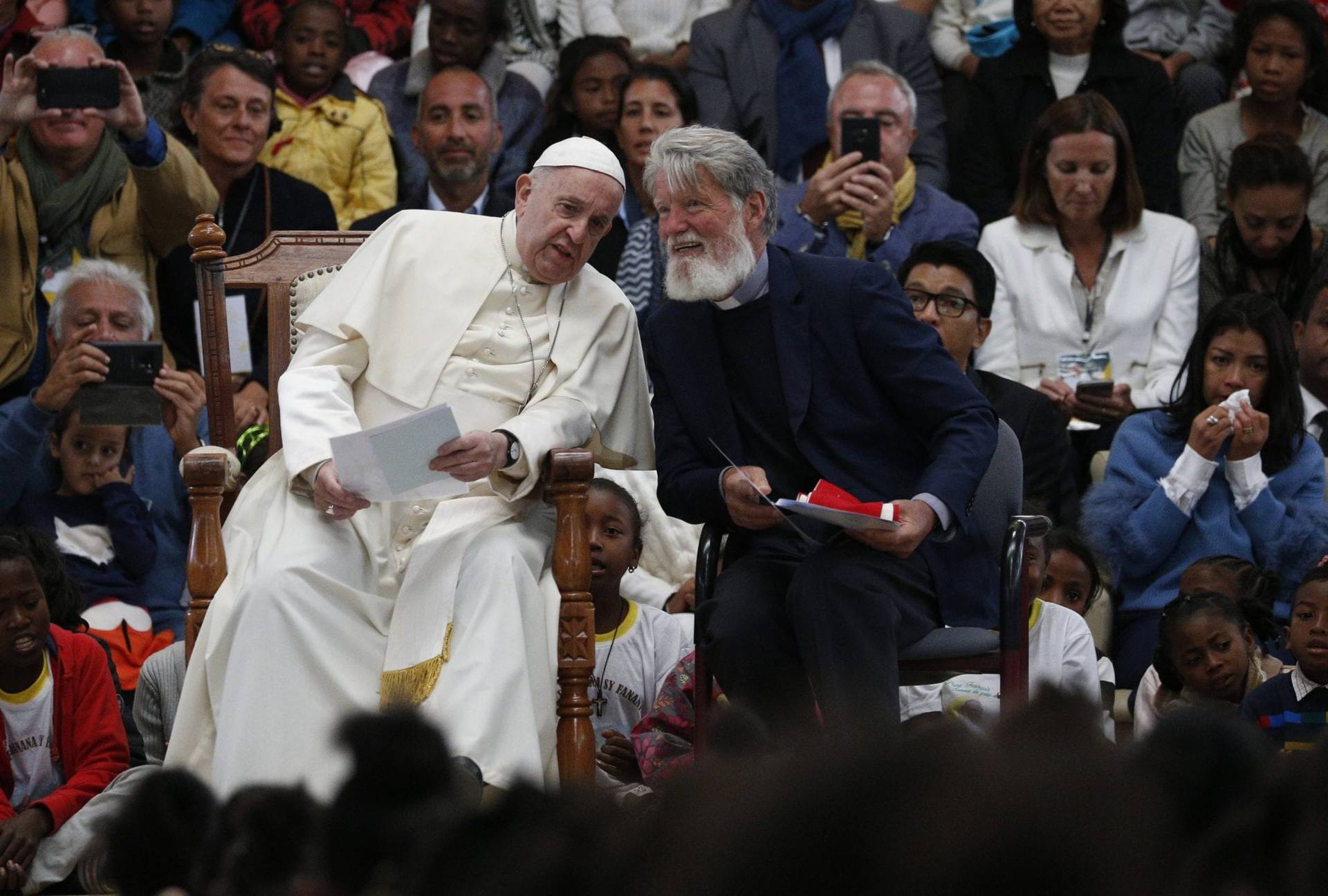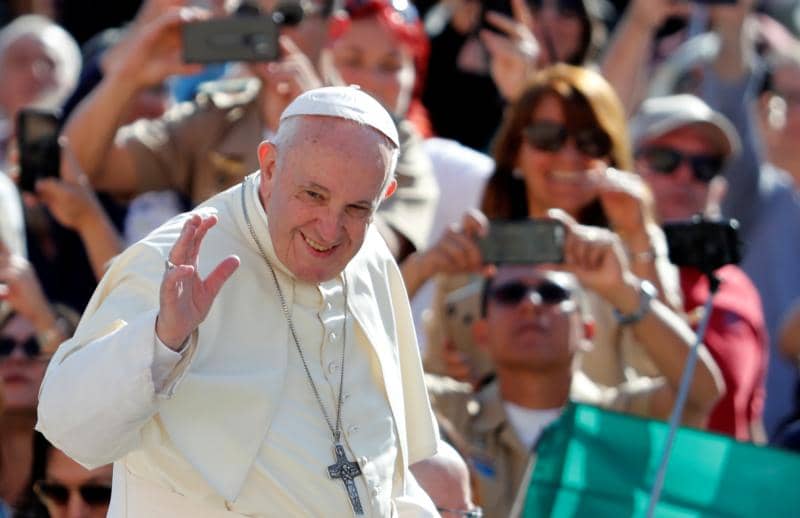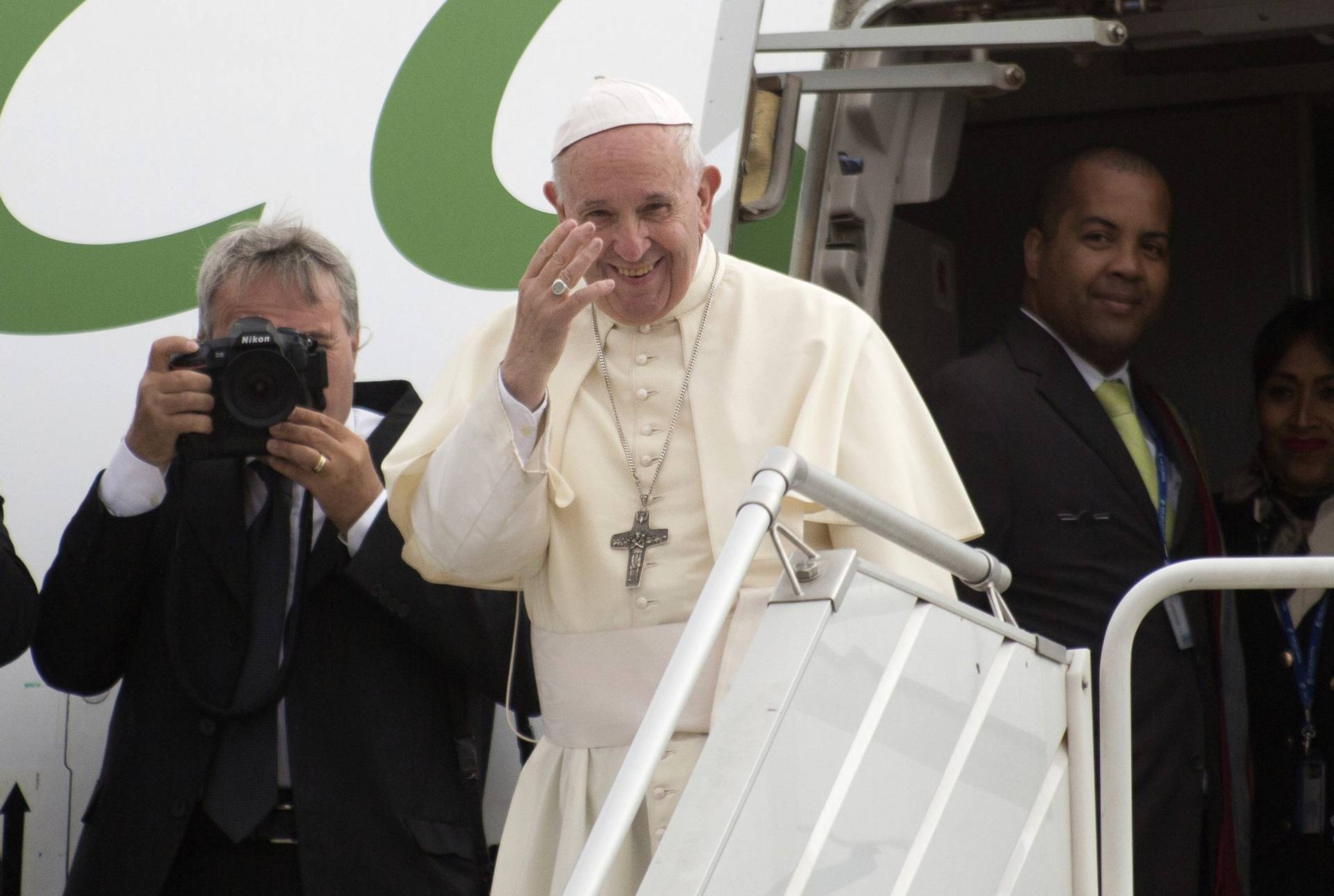PORT LUIS, Mauritius — During the eight hours Pope Francis spent in Mauritius, a multiethnic island nation in the Indian Ocean about 1,200 miles off the coast of Africa, he urged the inhabitants to remember their immigrant roots and to integrate those who are arriving as they were welcomed by their ancestors.
Francis also urged the local population not to grow tired in their evangelizing efforts, always keeping in mind that this needs a “young face,” telling locals to put the youth front and center.
“Missionary momentum always has a young and invigorating face,” he said during the homily at the Mass, his first official speech on the island. “For it is the young who, by their vitality and generosity, can give it the beauty and freshness of youth, when they challenge the Christian community to renewal and urge us to strike out in new directions.”
RELATED: Pope honors Mauritius diversity, urges ethnical development
This support of the young earned him the applause of the 100,000 who took part in the liturgy.
The pontiff’s quick visit to Mauritius, is the final leg of his Sept. 4-10 tour to Africa, which also included Mozambique and Madagascar. He delivered two speeches, one was his homily and the second a speech to local authorities.
“Thanks to this brief visit, I have the pleasure of encountering your people, known not only for cultural, ethnic and religious diversity, but above all for the beauty born of the ability to acknowledge, respect and harmonize existing differences in view of a common project,” Francis said Monday afternoon, addressing civil authorities and diplomats.
The history of the Mauritian people, he said, can be summed up in the arrival of migrants from different continents, each carrying their own traditions, cultures and religions.
The people of Mauritius, he said, gradually learned to “be enriched by the differences of others and to find ways of living together and striving to build a society committed to the common good.”
“In this regard, you possess an authoritative voice, one that has taken on life,” Francis said. “A voice that can remind us that it is possible to achieve lasting peace when we start with the conviction that diversity is a beautiful thing when it can constantly enter into a process of reconciliation and seal a sort of cultural covenant resulting in a ‘reconciled diversity’.”
However, Francis didn’t mention the fact that many of those who arrived on the island did so as slaves from Mozambique and other African nations, and then as cheap labor from India, brought in by the British after they abolished slavery.
It’s this history that planted the original seed of Mauritian diversity, that makes this small country of 1.4 million people the only African nation with a clear Hindu majority.
Mauritian migrant history, the pope continued on Monday, serves as the “foundation for the opportunity to build true fellowship with the greater human family, without feeling the need to marginalize, exclude or reject anyone.”
The national DNA, he said, carries the memory of the immigration movements that brought the ancestors of those who live here today to the island. The ancestors were open to differences and to integration for the benefit of everyone.
“For this reason, I encourage you, in fidelity to your roots, to take up the challenge of welcoming and protecting those migrants who today come looking for work and, for many of them, better conditions of life for their families,” Francis said, before urging them to be protagonists of a “true culture of encounter.”
This diversity was clearly visible as thousands waited for Francis along the road from the airport to the city, where one could see Hindu elders and women with saris, people wearing “Welcome Pope Francis” t-shirts, and westerners here on tourism or business – Mauritius is considered a tax haven.
The Muslim presence was felt during the Mass, when the call to prayer from a nearby mosque could easily be heard.
The pope also noted Mauritius’s steady economic development, which he defined as a “reason to rejoice, but also to be on guard.”
As things stand, he said, this economic growth has left many people behind, particularly the young.
“That is why I would like to encourage you to promote an economic policy focused on people and in a position to favor a better division of income, the creation of jobs and the integral promotion of the poor,” he said, telling the country not to fall into the temptation of following an “idolatrous economic model that feels the need to sacrifice human lives on the altar of speculation and profit alone, considering only immediate advantage to the detriment of protecting the poor, the environment and its resources.”
This is something he also touched upon earlier in the day, as he said Mass at the Monument to Mary, Queen of Peace; the same hill where his predecessor, Pope St. John Paul II, said Mass during his visit to Mauritius 30 years ago.
During his homily, he spoke about the young, and the duty older generations have in trusting them and making room for them in society.
“It is a hard thing to say, but, despite the economic growth your country has known in recent decades, it is the young who are suffering the most,” Francis said. “They suffer from unemployment, which not only creates uncertainty about the future, but also prevents them from believing that they play a significant part in your shared history.”
A sign of the country’s growing economy could be seen in the striking difference of experiencing the papal events in Mauritius, compared to the previous stops in Mozambique and Madagascar: In Mauritius, people were capturing the moments on their phones, devices that were notably absent from the hands of most in the other two nations.
As had been expected, Francis also spoke about the importance of caring for God’s creation, something particularly necessary in a country that was once as biodiverse as neighboring Madagascar, but due to the influence of the British colonizers, is now missing a large amount of its forests which were torn down to create sugar cane plantations.
Despite the change in the landscape, Mauritius remains an impressively green, volcanic island, known for its varied flora and fauna, with many endemic species; the most famous of which is probably the extinct dodo bird, killed off in the 17th century by visiting sailors using it as a food source.
As a security officer put it to Crux, “it’s so beautiful, that it’s clear God first created Mauritius and then paradise.”
The green, turquoise waters and clear sandy beaches make it easy to understand why Mauritius is becoming a favorite touristic destination, especially for visitors from Europe.
Attending the Mass was a 50-member delegation from the Chagos Islands, an Indian Ocean archipelago that includes the U.S. air base on Diego Garcia. During the offertory, people from this island brought some of the offerings, as a way to make their plight visible.
Britain held onto Chagos after granting Mauritius its independence in 1968.
In the 1960s and 1970s, Britain evicted some 2,000 people from Chagos so the United States could build an air base at Diego Garcia. Some resettled in the United Kingdom, but have been fighting in local and international courts to return to their islands.
Earlier this year, the United Nations General Assembly voted in favor of demanding that Britain end its colonial administration of the island and, subsequently, cancelling the U.S. lease on Diego Garcia. The UK has refused all requests to relinquish Chagos, calling the islands “strategically important.”
In the afternoon, Francis was scheduled to fly back to Madagascar, where he’ll spend the night in Antananarivo before heading back to Rome on Tuesday morning.
Follow Inés San Martín on Twitter: @inesanma
Crux is dedicated to smart, wired and independent reporting on the Vatican and worldwide Catholic Church. That kind of reporting doesn’t come cheap, and we need your support. You can help Crux by giving a small amount monthly, or with a onetime gift. Please remember, Crux is a for-profit organization, so contributions are not tax-deductible.
















